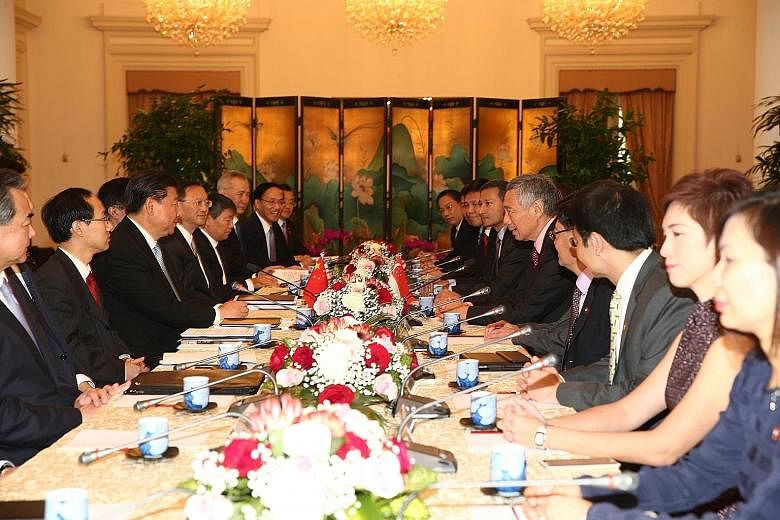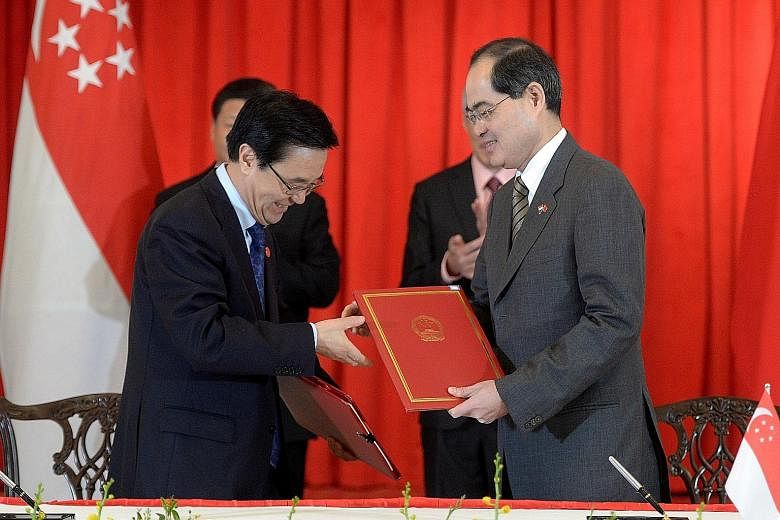Singapore businesses can look forward to greater protection for their investments in China, fewer barriers to investing there and more access to the country's services sector.
This is the aim of a review of the China-Singapore free trade agreement (CSFTA), which is targeted for completion next year.
Minister for Trade and Industry Lim Hng Kiang exchanged letters with his Chinese counterpart, Minister of Commerce Gao Hucheng, yesterday to officially start talks to broaden the scope of the pact first signed in 2008.
"A forward-looking, substantive and comprehensive upgrade of the CSFTA will enhance support for ongoing and future collaborations between Singapore and China," said Mr Lim.
A Ministry of Trade and Industry (MTI) statement noted that the enhanced CSFTA will inject new dimensions and refresh its relevance to the business communities in both countries.
-
Number of bilateral deals signed
-
Eight memoranda of understanding and agreements, spanning key areas of bilateral cooperation, were signed between Singapore and China yesterday. The highlights:
• The review of the enhanced China-Singapore Free Trade Agreement is targeted for conclusion next year. It aims to give Singapore businesses more protection for their investments in China, eliminate more barriers to investing in China and help firms gain more access to China's services sector.
• The third government-to-government project in Chongqing will focus on financial services, aviation, transport and logistics, and information and communications technology. This will boost investment in Chongqing, a boon for Singapore banks which have a presence in the city.
• Nanyang Technological University will set up a joint research institute in Guangzhou with South China University of Technology that aims to foster development of new technology such as electric vehicles.
The upgraded agreement "will provide our businesses with enhanced trade facilitation and greater investment protection in China, as well as address investment barriers".
The two countries will also explore greater cooperation in the services sector, in areas such as legal services and financial services. New areas such as environment and e-commerce will also be included to keep the CSFTA "abreast of global developments".
The CSFTA was the Chinese government's first such agreement with an Asian country. It has since gone on to sign several FTAs with other countries.
Currently, 95 per cent of Singapore's exports to China are already duty-free, while there are no tariffs on all Chinese exports to Singapore. Singapore and Chinese companies in hospital and selected business services sectors enjoy preferential access in each other's markets. In addition, Chinese companies in the education services sector also enjoy greater access to Singapore.
The business community in Singapore welcomed the review, calling it a "timely move".
"It has been nearly seven years since the agreement came into force (in January 2009) and the services sector in China has seen an increase in activities (since then)," said Singapore Business Federation council chairman Teo Siong Seng, better known as S. S. Teo.
"There could be new forms of investments in these sectors (for our businesses)," he said, adding that there is more room for China to lift market restrictions in the healthcare, education and eldercare sectors.
Dr Cheah Kim Fee, chief executive of Q&M Dental Holdings (China), was hopeful that Singapore investors would be able to set up 100 per cent foreign-owned operations in the medical sector.
The Singapore-based dental chain has three hospitals and eight polyclinics, with more than 100 dentists in the Liaoning province of China. It operates in China through a joint-venture (JV) with a local partner.
"Although healthcare is a very localised sector, where we would want to work with a JV partner, it would be great if we could have the option to go it alone," said Dr Cheah.
Law firm Rajah & Tann's Mr Chia Kim Huat noted that investments in the business services sector are generally "out of bounds". He hopes that professionals like lawyers, accountants, valuers and architects will be allowed to have JVs or even set up their own companies in China to provide local services.
"When the Chinese (companies) move out to the region, we then can advise them on local compliances issues and regulations," said Mr Chia, who is the firm's regional head for corporate and transactional practice.
The firm now operates a representative office in Shanghai, where it has limited operational scope.
"We have to work with the local (law) firms, which is not ideal," he added.



